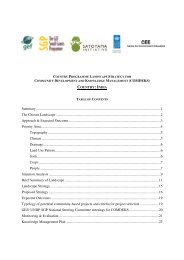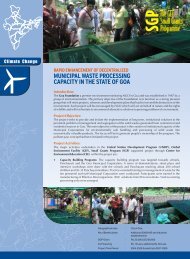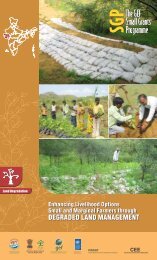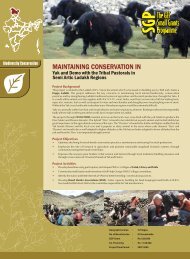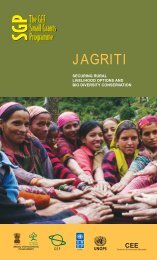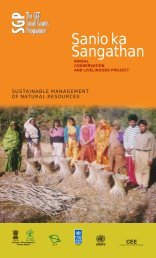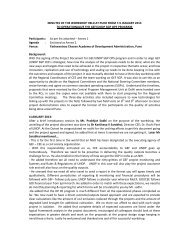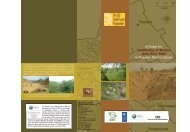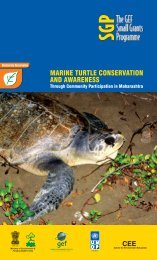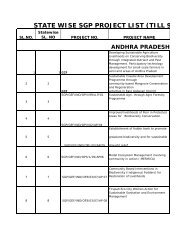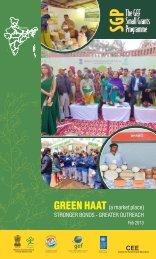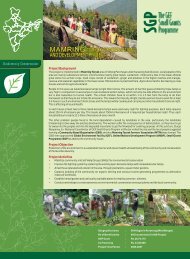A HANDS AND GLOVE STORY
Dharohar Samiti Folder F.cdr - SGP India
Dharohar Samiti Folder F.cdr - SGP India
Create successful ePaper yourself
Turn your PDF publications into a flip-book with our unique Google optimized e-Paper software.
Create community consciousness through critical reflections about their own conditions, risks<br />
and opportunities in using SRI techniques to traditional Rice Growing Farming systems.<br />
Experiment low cost easy-to-adapt and manage technologies. Creating a Gene Bank and<br />
sharing of Plant Genetic Material with National Bureau for Plant Genetic Resources (NBPGR),<br />
New Delhi.<br />
Project Background<br />
Dharohar Samiti, a farmer's organization has been<br />
working in 10 villages of Kondagaon Tehsil of<br />
Kondagoan District in Chhatisgarh for over 15 years<br />
to promote agro bio-diversity conservation and<br />
secure livelihoods and nutrition for farmers.<br />
Dharohar joined hands with the GEF/UNDP Small<br />
Grants Program (SGP), CEE in this mission to<br />
conserve over 260 traditional rice varieties along<br />
with other minor millets such as raagi, kodo and<br />
kutki. The aim of the project has been to construct<br />
opportunities for dialogue in a context of<br />
commitment and concern for conservation practices<br />
encouraging to generate self-confidence, selfrespect,<br />
self-esteem.<br />
Dharohar Samiti, with the help of GEF/UNDP SGP<br />
project has introduced the System of Rice<br />
Intensification (SRI). SRI is an organic farming<br />
technique that requires only about 1/10th seed and<br />
less water compared to the traditional method of<br />
farm flooding and larger spacing between rows.<br />
Attention to soil health balance helps in increasing<br />
the yield.<br />
Dharohar has demonstrated effective ways of agrobiodiversity<br />
conservation along with yield<br />
enhancement using organic methods that are critical<br />
for the ecological integrity of this agro-climatic tribal<br />
region of Bastar in Chhattisgarh State of India.<br />
Project Objectives<br />
Name of the Organisation<br />
Dharohar Samiti<br />
Geographical Areas<br />
10 Villages in Ist Project (2006-09) and<br />
Scaled upto additional 5 Villages in 2nd<br />
Project (2010-13) with an outreach to 2800<br />
House Holds in Kondagaon Block & District<br />
No. of Beneficiaries<br />
Ist Project (1400 House Holds) & Scaling<br />
up outreach to (2800 House Holds) in an<br />
area of 1650 hectares<br />
SGP Grant<br />
` 15,20,000<br />
Co-Financing<br />
` 6,57,672<br />
Project time period<br />
th<br />
th<br />
16 April, 2010 to 15 October, 2013<br />
Project Partner<br />
Department of Agriculture; Environment of<br />
Forest; Local Banks; Village Panchayat; Sir<br />
Dorabji Tata Trust; (SDTT); ATMA Program;<br />
KUK Raipur, NBPGR, ICAR New Delhi<br />
Project Activities<br />
• SRI promotion – 2500 farmers at district and block level; and 50 farmers outside district<br />
trained in applying SRI technique for rice cultivation in the varieties for Paddy as Lucliaii; Gada<br />
Khunta; Asam Cliuddi; Sapadi; Kurlu Bhoti; Bagdi Cludi; Bauv Sapli; Jhodra Dhan; Lokti Bhajji;<br />
Sugar Luchaii; Narii Cliudi; Murdai Cliudi; and Hardi Chiudi.<br />
• Scientific seed production with 35 farmers - 1 acre per farmer. The seed production plots<br />
established in the first year of the project to develop sufficient yield for next year and outreach<br />
to more farmers.<br />
• SRI demonstration and Compost Tanks with Madia (Raagi/finger millet) which has sizeable<br />
potential locally as well as in urban markets and in villages of Golawad; Ghodavad; Jhara;<br />
Phulewar; Kanwasaar; Mohlai; Mundagaon; Ravanwadi; Hiramandal; Karanpur; Kaadigaon<br />
and Hasalnaar.<br />
• Training on Herbal Medicines – As rice attracts various pests, farmers are using lot of pesticides.<br />
Locally based herbicides which are tried in SGP project disseminated to farmers interested in<br />
SRI through trainings. Total 300 farmers trained to develop herbal medicines from locally<br />
available plant resources.<br />
• Dharohar has created a demonstration facility by sowing their rice varieties every year on a 2.5<br />
acre farm in Golawand village and keeps the genetic evolution process on. In addition, it is also<br />
distributing the seeds to farmers, promoting exchange of seeds and herbal pesticide<br />
development culture among farmers and sharing of information widely with tribal<br />
communities through village level meetings and madai-melas.<br />
• Exposure - 20 farmer leaders from nearly 15 villages exposed to organizations like Vrihi-West<br />
Bengal, DDS-Andhra Pradesh, Lok Panchayat-Ahmednagar, Maharashtra and villages like<br />
Mendha Lekha, Maharashtra to learn about seed conservation and PBR development. Also<br />
then create a community-led institution.<br />
• Characterization and Nutritional assessment of 35 varieties, i.e. potential and specific<br />
characteristics like aroma, texture, storage keeping qualities, nutrition etc. Scientific<br />
characterization carried out of all these varieties for establishing distinguished identity and<br />
further linking those to markets.<br />
• PBR training and micro plan development in 10 villages. Biodiversity Registers developed by<br />
forming Biodiversity Management Committees (BMCs) under Biodiversity Act 2002, and<br />
water conservation activities under NREGA.<br />
Project Results<br />
• One seed bank is set up in Golawand for propagation<br />
and promotion through exchange and distribution of<br />
seeds. More than 2500 farmers in direct touch from 20<br />
villages.<br />
• 262 indigenous rice varieties identified, labelled and<br />
stored for distribution and propagation in the Region<br />
with more than 550 farmer households (HHs).<br />
• 200 farmers learned about the benefits and conservation<br />
of indigenous local rice varieties; SRI technique and its<br />
benefits.<br />
• Demonstrated scientific seed production of 35<br />
indigenous rice varieties with 35 farmers - 1 acre per<br />
farmer. Production of 50 indigenous rice varieties done<br />
with 60 farmers.<br />
• SRI demonstration of 03 indigenous local ragi varieties<br />
with 69 farmers.<br />
• Increase of 25% in farmers cultivating the indigenous<br />
local rice varieties and ragi varieties through SRI<br />
technique.<br />
• 200 farmers learned about the making of Handi biopesticide;<br />
Jeevamrut bio-pesticide after trainings to<br />
develop herbal medicines from locally available plants.<br />
• 255 indigenous local rice varieties were cultivated<br />
through SRI technique for scientific characterization;<br />
and nutritional assessment of 35 indigenous local rice<br />
varieties is on process.<br />
• 4 new indigenous rice varieties identified and<br />
conserved. The data shared with NBPGR New Delhi.<br />
• 10 BMCs have been formed and the preparation of PBRs<br />
is under process in 10 villages. More emphasis is laid by<br />
the NGO and the communities on how to use the<br />
different varieties for better nutrition and productivity<br />
benefits<br />
• Participated in the State/Zone level Organic Farmers and<br />
Conservers Meet to show case achievements, potential<br />
and linkages with Government and market.



